PAGE
MDMA Magic Survey - Mediating Variables Analysis
New to RollSafe.org or MDMA? Check out our overview page.
Contents
Full credit to Ahnjili, and to RC for the introduction to Ahnjili.
Ahnjili - thank you for helping advance the cutting edge of research around the loss of MDMA’s magic! This may become particularly important as MDMA looks to become a prescription drug in the US for treating PTSD as early as 2021.
Which factors most accurately predict whether someone will lose the “magic” of MDMA over time?
The main gist of the story is that frequency of consumption (and not total number of sessions of MDMA), mental health and physical health are key factors in predicting mdma magic loss.
The Process
I sent out an email to RC and asked them:
I have a good dataset from ~660 people from a survey on what causes the loss of MDMA’s magic. https://rollsafe.org/mdma-magic/
Right now, the analysis is purely r values. I believe (but correct me if I’m wrong) that it could be more useful using statistical techniques to identify what the mediating variables are. I had an attempt at learning enough R-studio to do the mediating analysis myself, but failed.
Is there someone you know who may be willing for me to send them the dataset and then have them attempt to identify the mediating variables using R studio or excel?
Less than 10 minutes after they forwarded it to some colleagues, the excellent Ahnjili volunteered.
The Results
The main gist of the story is that frequency of consumption (and not total number of sessions of MDMA), mental health and physical health are key factors in predicting mdma magic loss.
The visible circles reflect only the significant correlations.
There was not enough data to assess whether supplements were a key factor. Ahnjili estimated that “Seeing that the demographic and methods of consumptions are so heterogeneous, a rough estimate would be a minimum of 50 people per drug per supplement” to learn whether these were key.
For the regression analysis at the bottom, we can confidently say that an increase in frequency of mdma consumption accurately predicts the amount of euphoria loss, whilst total no. of mdma sessions does not predict euphoria loss. So this means that an increase in MDMA frequency will certainly increase euphoria loss, whilst an increase in total MDMA sessions does not necessarily increase euphoria loss.
Images
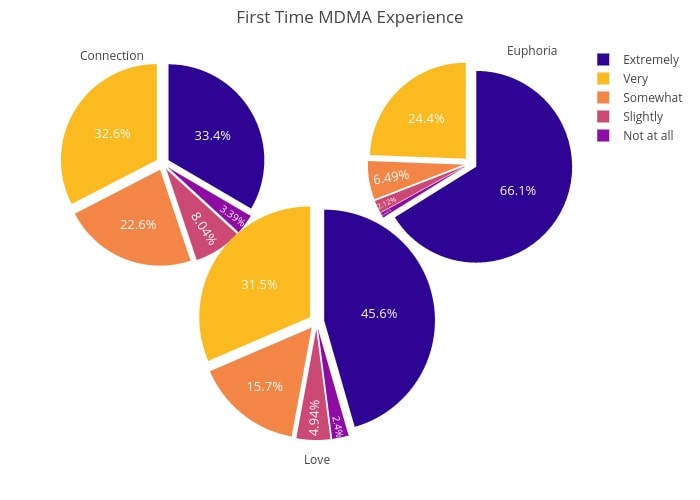
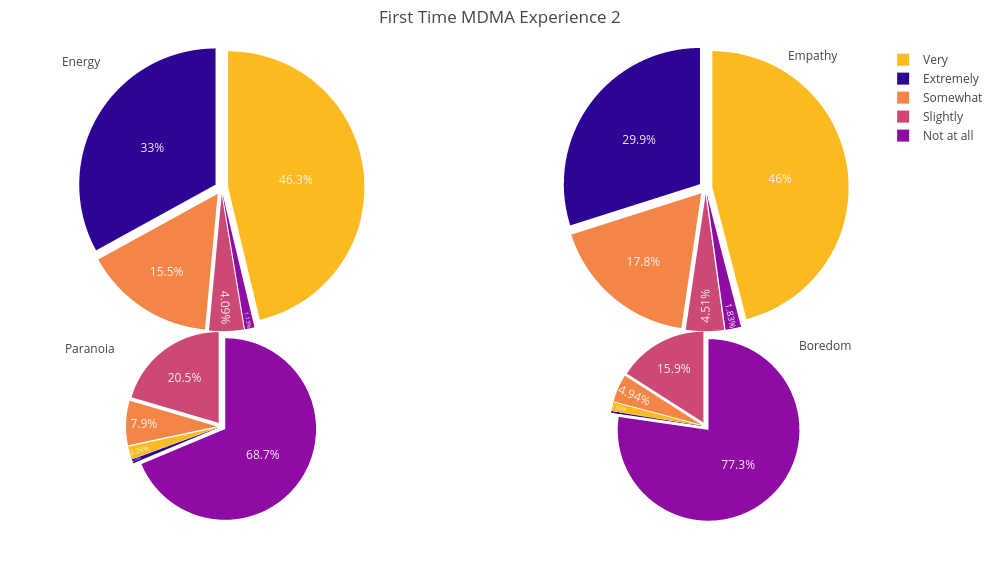
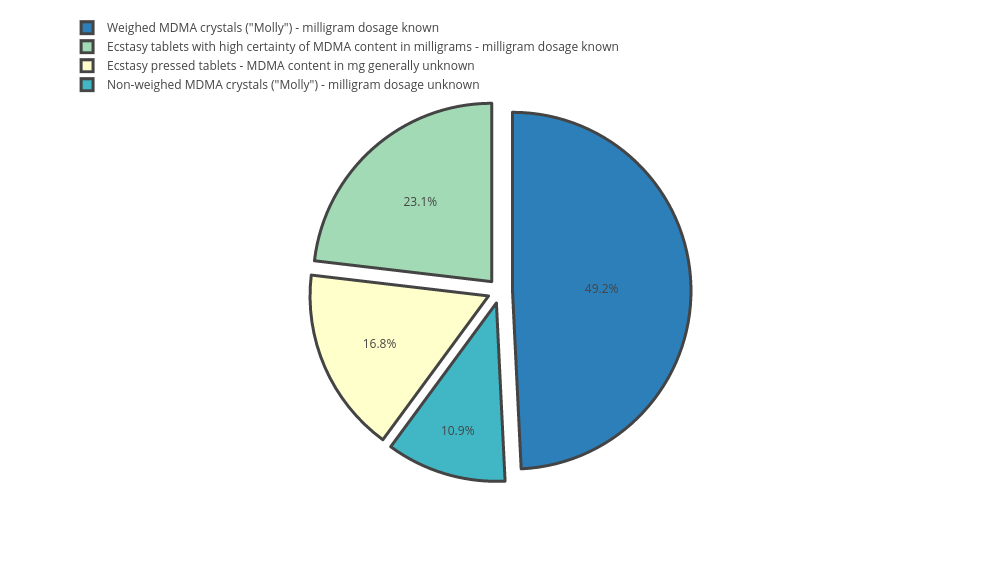
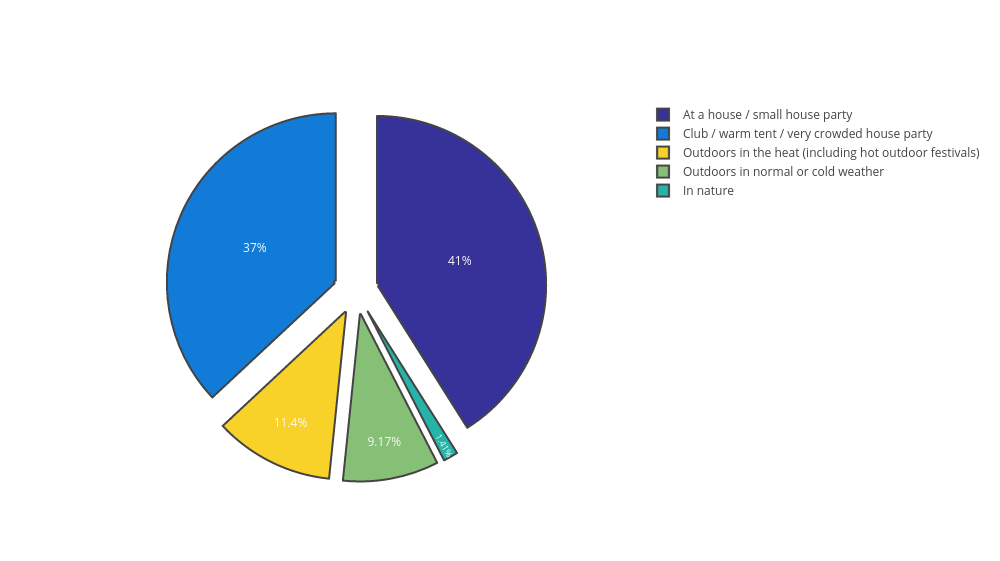
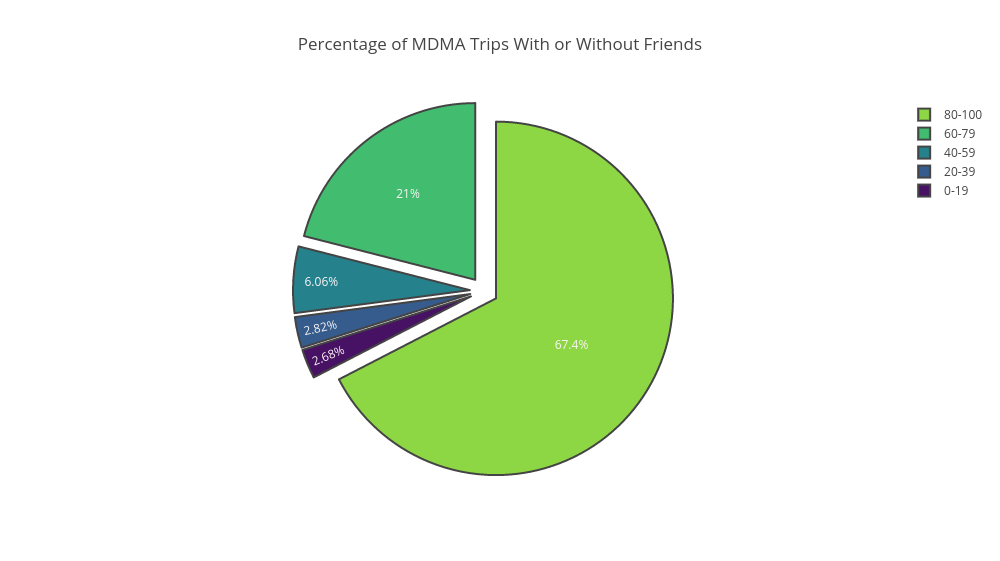
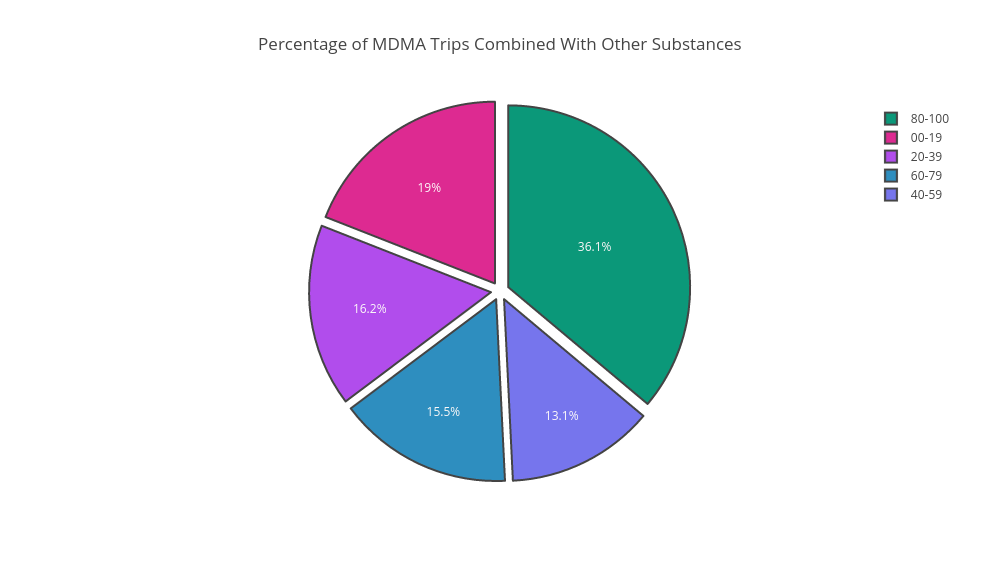
Correlation plots
(correlations that are insignificant (p>0.05) are left blank)
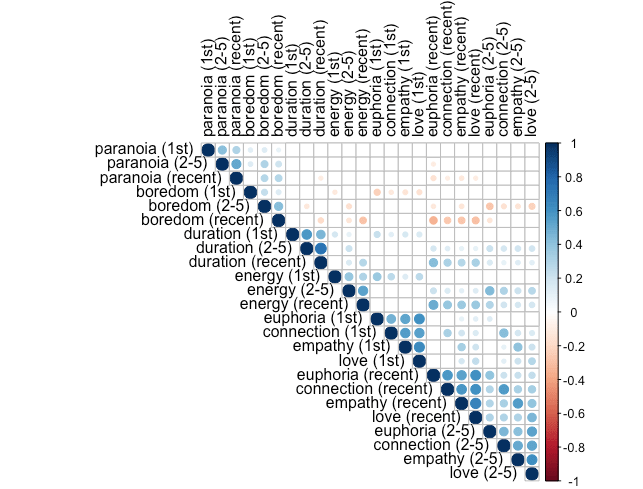
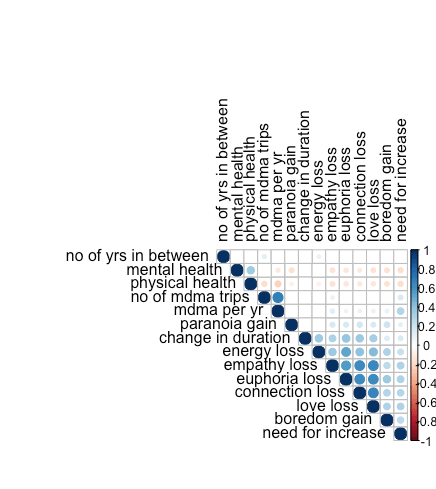
Qs I asked
Could we determine the “minimum” break length approx to avoid losing the magic?
They answered:
Technically yes and no. From the linear regression model people could in theory calculate how many doses it would take to magic loss based on their baseline/initial experience of MDMA. But as they’re so many variables and so much heterogeneity among users, drug administration and drug use, it would not be an accurate representation/recommendation.
Could we list out the factors that had high correlation with less magic loss, but that seemed not to be mediating factors from your analysis (i.e. the ones where they correlated with magic loss, but it seems they weren’t a mediating variable, instead it just happened to be that they correlated with a mediating variable which in turn correlated with magic loss)? i.e. the factors that seemed important from my initial r-value only analysis, but may not be that important.
If you are referring to the regression analyses, I did not include all the factors in the regressions as that would lead to the under/over fitting of the regression model on the outcomes. As a result, too many factors in the model would lead reduce the significance of the most important factors.
Is it accurate to say from your results that factors other than - frequency of consumption (and not total amount of mdma consumption), mental health and physical health - e.g. total number of sessions, number of booster doses - are not strongly predicting factors, and the degree to which they correlate with magic loss is just because they correlate with the actual predicting factors (i.e. total number of sessions may correlate with magic loss, but that appears to be just because it correlates with frequency of consumption, which predicts magic loss, or something like that)?
(and of course there may be some more predicting factor that the survey didn’t measure, but that the three you mentioned are the most predictive factors of what was measured)
From the correlation plots, we can say that the blue circles show that subjects who experience x also experience y. For example, subjects with higher no. of mdma sessions per year are also subjects who experience greater empathy and euphoria loss. Whilst the red circles say that subjects who experience x are not people who would also experience y. So subjects with better mental health (a high score) will experience lower euphoria loss (a low score).
For the regression analysis at the bottom, we can confidently say that an increase in frequency of mdma consumption accurately predicts the amount of euphoria loss, whilst total no. of mdma sessions does not predict euphoria loss. So this means that an increase in MDMA frequency will certainly increase euphoria loss, whilst an increase in total MDMA sessions does not necessarily increase euphoria loss.
More Results
Linear Regression:
Simple linear regression model (lm) from the lme4 R package. Significance calculated with ANOVA.
What factors predict MDMA magic loss (by subjective domains)
Loss in Connection:
no_of_mdma_per_year: p=0.02
As MDMA consumption frequency increases, loss of connection increases. (No significant relation between number of MDMA experiences and loss of connection)
Mental health: p=0.004
People with better mental health experience less connection loss (no effect of physical health)
Loss in Euphoria:
no_of_mdma_per_year: p=0.03
As MDMA consumption frequency increases, loss of euphoria increases. (No significant relation between number of MDMA experiences and loss of connection)
Mental health: p<0.00, physical = 0.03
People with better mental health & physical health experience less euphoria loss
Loss in Empathy:
no_of_mdma_per_year: p<0.000
As MDMA consumption frequency increases, loss of empathy increases. (No significant relation between number of MDMA experiences and loss of connection)
Mental health: p<0.00, physical = 0.01
People with better mental health & physical health experience less empathy loss
Loss in Love:
no_of_mdma_per_year:p<0.02
As MDMA consumption frequency increases, loss of empathy increases. (No significant relation between number of MDMA experiences and loss of connection)
Mental health: p<0.00
People with better mental health experience less love loss
Increase in Boredom:
no_of_mdma_per_year: p<0.02
As MDMA consumption frequency increases, experience of boredom increases. (No significant relation between number of MDMA experiences and loss of connection)
Mental health: p<0.00 & physical: p=0.01
People with better mental and physical health experience less magic loss
Paranoia:
No effect of MDMA consumption or consumption frequency on paranoia.
However people with poorer mental health tend to experience more paranoia (p<0.00)
Source Data and R Scripts
New to RollSafe.org or MDMA? Start here.
This work is licensed under a Creative Commons Attribution-ShareAlike 4.0 International License.
Recommended documentary about MDMA therapy: Trip of Compassion.